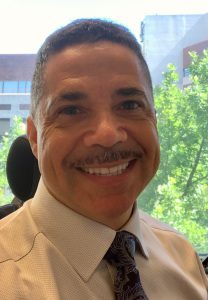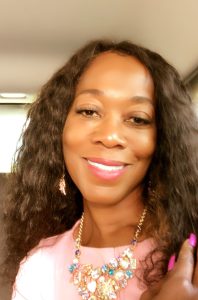For decades, February has marked Black History Month, which honors the triumphs and struggles of African Americans throughout U.S. history. In celebration of Black History Month, the Vitals team reached out to Sutter Health healthcare workers to learn what this month means to them.
Roberta Stensrud, Nurse Manager, eICU & Central Telemetry Monitoring Valley Area

Roberta Stensrud, Nurse Manager eICU and Central Telemetry Monitoring
What does Black History Month mean to you?
The obvious answer is the acknowledgment of being Black in America through a calendar month. Black History Month allows me to slow down and reminisce on the multiple accomplishments of African Americans across the diaspora. Black history isn’t always about struggle—which is where many minds drift to in an almost pity mentality. I purposefully seek out emerging Black excellence in healthcare that may go overlooked. Black history is celebrating each other and the astonishing contributions we have given to the world.
Are there any particular contributions or achievements made by Black Americans that you wish to highlight? Anyone who inspires you and why?
I stop to think about my 24-year journey in healthcare and how far I have come. I am a unicorn in healthcare being a Black female nurse manager (or above) in an ICU realm, and this is not lost on me. 14.6% of Black nurses have a Master’s degree or doctorate (compared to 13.4% of white counterparts), but do not hold management titles (See this minority nurse site for more information).
I can attend many meetings in a week and nobody looks like me. As a member of Sutter Health’s Multicultural IRG, I hope to illuminate this staggering low number of Black leaders within Sutter Health and assist in mending the future.
I’m inspired by Kizzmekia S. Corbett, Ph.D., who was a leading scientist working with the COVID-19 vaccine. She is currently working on producing a universal influenza vaccine. Blacks have extreme hesitation with healthcare due to years of health inequities and violations. Having Dr. Corbett as the face of the COVID-19 vaccine was instrumental in people of color taking the vaccine and trusting the process.
Is there anything about Black History Month that you especially enjoy celebrating?
I walk into February with the largest smile on my face every year and joke with my husband that this is my month. It is not lost on anyone that it is the shortest month and as a collective, we are used to being short-changed. Hence this is why we celebrate across the diaspora with food, shared stories of our ancestors and getting involved in our community through outreach.
Thomas Rhodes, Senior Director, Cardiovascular Services, Sutter Medical Center, Sacramento

Thomas Rhodes, Senior Director, Cardiovascular Services
What does Black History Month mean to you?
It is acknowledgement and recognition of the rich history and stories of the African American experience, both positive and negative. I also believe that it is necessary that Black History Month exists as our nation still has a way to go before there is equity in society for all people. This is evidenced by recent events and discussions in today’s society around race and equity in our nation (as evidenced by the “critical race theory” discussion and the banning of essential educational teachings of history in the United States). I look forward to the day when Black history is not celebrated for one month out of the year, but instead is celebrated daily as part of the fabric of this nation.
Are there any particular contributions or achievements made by Black Americans that you wish to highlight? Anyone who inspires you and why?
Contributions and achievements of Black Americans is so vast that to narrow it down to a few does not do justice to all the contributions since the early 1600s when the slave trade began (some historians indicate the late 1500s).
Since we are in healthcare, I will highlight a few Black pioneers:
- James McCune Smith, M.D.: The first African American doctor with his own practice in the U.S.
- Harriet Tubman: Known for her role as conductor of the Underground Railroad, Tubman was also a nurse during the Civil War providing care to Black soldiers and liberated slaves.
- Charles Richard Drew, M.D.: Developed blood preservation leading the way for blood transfusions. Roughly 5 million people receive blood transfusions annually in the U.S. often resulting in the preservation of life.
- Mary Eliza Mahoney: First Black woman to earn a professional nursing license, and in 1879 she was the first to graduate from an American nursing school.
- Louis Wade Sullivan, M.D.: The first founding dean of the Morehouse School of Medicine, which is the first predominately Black medical school in the U.S.
- Daniel Hale Williams, M.D.: Opened the nation’s first Black-owned interracial hospital in 1884 and established America’s first school for Black nurses.
- Jocelyn Elders, M.D.: The first Black person and second woman to hold the position of U.S. Surgeon General.
Is there anything about Black History Month that you especially enjoy celebrating?
I would not use the word celebrate as much as appreciate the information sharing across multiple media platforms of the accomplishments of Black Americans throughout the history of this country. It is both intriguing and entertaining to know some of the contributions made by Black Americans such as the creation of potato chips, gas masks, dry cleaning, the 3-light traffic signal, peanut butter and the lawn mower to name just a few. The list is endless, but this information is not always made readily available for the consumption of the general public. It is during Black History Month when this information is shared openly for all Americans to consume.
Angela Trapp, Patient Experience Consultant, Sutter Independent Physicians

Angela Trapp, Patient Experience Consultant
What does Black History Month mean to you?
I think of the word reflection, scheduled reflection. Reflecting on the contributions and bravery and courage of my ancestors, something I do throughout the year. I constantly draw on their strengths to meet the challenges of today.
Who do I want to highlight for Black History Month?
The many mothers and fathers of African American children. I know that you wake them up affirming their value and telling them how important they are, such an important message, and sometimes this is not the message that they receive.
Is there anyone who inspires you?
Those in the trenches—the teachers, a mentor, and especially those who take interest in our culture, with curiosity versus judgment.
Is there anything about Black History Month that you especially enjoy celebrating?
Family gatherings and truly, truly the soul food!





